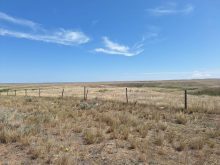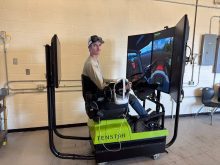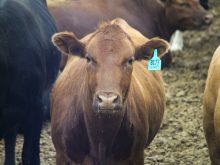If you’re looking for late admittance to an agriculture program at one of Alberta’s colleges and universities, you may be out of luck.
As of late September, six of Olds College’s agriculture programs were at capacity with waiting lists, while others were nearing capacity, said Jen Donofrio, director of strategic enrolment management.
“We’ve had an increase in the school of about seven per cent from last year,” said Donofrio. “We’ve had, in the last couple of years, strong numbers in that school, but it’s just an indication that we continue to grow even stronger.”
Read Also

Farming Smarter receives financial boost from Alberta government for potato research
Farming Smarter near Lethbridge got a boost to its research equipment, thanks to the Alberta government’s increase in funding for research associations.
Olds School of Agriculture dean, Tanya MacDonald is pleased by the growth, particularly in the agricultural management diploma program.
“We’re seeing great enrolment this year,” said MacDonald. “For our agricultural management diploma, we have 74 first-year students this year. Most years, we would be fairly consistent around the 60 to 65 number, so 74 is up there for us.”
Enrolment is also up at Lakeland College. “Our enrolment numbers in our agriculture programs are quite strong and have been increasing every year,” said Josie Van Lent, dean of Agricultural Sciences and Human Services for the college. “We’ve doubled our numbers in the last seven years, and this is probably one of our strongest years for enrolment in a 20-year period.”
Nat Kav, the University of Alberta’s associate dean of Agricultural, Food, and Nutritional Science, credits the school’s growth over the past five years to the B.Sc. in Animal Health program, which has been at capacity for the past two years.
“Over the last five years, we have observed a significant increase and substantial growth,” Kav said. “We created a new B.Sc. in Animal Health, with a view of attracting more urban students into these programs, and that program has done extremely well.”
Demographic shift
As enrolment has increased, each of the schools has also seen a change in demographics.
“We are seeing more women interested in the program, but we’re also seeing a demographic shift in more applicants coming from urban backgrounds, not necessarily off the farm,” said MacDonald. “That would still be the majority of our students, but we only used to get a few students that weren’t from the farm, and now we’re seeing a few more of those each year.”
Lakeland College has also seen an increase in students who don’t come from traditional agriculture backgrounds. Van Lent thinks this growing interest in agriculture is a direct result of a strong overall agriculture industry.
“Projections are that the industry will remain quite strong for a number of years in order to fulfil the demand for food as the world population continues to grow, and as young people hear that, it renews their interest in the industry because they know long term that there should be some good job opportunities,” she said.
MacDonald agrees. “It’s a really positive environment right now, and I think that has translated into the increase in our enrolment that we’re seeing this year.”
While many students still take their post-secondary education back to their own farming operations, MacDonald feels that students are seeing the abundance of agricultural industry jobs as well. “There are so many different areas you can work in the industry now, and I think that’s partly what’s driving more interest.”
Lakeland College has also seen strong opportunities for its grads, something Van Lent suspects will continue as baby boomers retire.
“I’m pleasantly surprised by how some of our grads from the past seven years have done, how quickly their career opportunities have grown,” Van Lent said. “They start in entry-level positions and quickly move up into stronger job opportunities. I think that’s enticing for students.”
The schools will be looking to meet that growing demand through new programs, continuing education courses and online learning, especially in areas such as agronomy, entrepreneurship, and animal health.
But any growth in programming at Olds College will not come at the expense of a positive student experience, says MacDonald. “We pride ourselves on a very hands-on learning environment, and we want to ensure we have a quality experience for the students that are here. For now, we’ll be capping our program at 75.”














